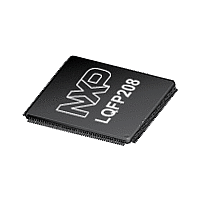LPC2939 NXP Semiconductors, LPC2939 Datasheet - Page 18

LPC2939
Manufacturer Part Number
LPC2939
Description
The LPC2939 combine an ARM968E-S CPU core with two integrated TCM blocksoperating at frequencies of up to 125 MHz, Full-speed USB 2
Manufacturer
NXP Semiconductors
Datasheet
1.LPC2939.pdf
(99 pages)
Available stocks
Company
Part Number
Manufacturer
Quantity
Price
Company:
Part Number:
LPC2939FBD208
Manufacturer:
NXP
Quantity:
105 000
Company:
Part Number:
LPC2939FBD208,551
Manufacturer:
NXP Semiconductors
Quantity:
10 000
Company:
Part Number:
LPC2939FET208,551
Manufacturer:
NXP Semiconductors
Quantity:
10 000
NXP Semiconductors
LPC2939_3
Product data sheet
6.6.3.1 ETM/ETB
6.6.4 Power supply pins
6.7.1 Clock architecture
6.7 Clocking strategy
The ETM provides real-time trace capability for deeply embedded processor cores. It
outputs information about processor execution to a trace buffer. A software debugger
allows configuration of the ETM using a JTAG interface and displays the trace information
that has been captured in a format that a user can easily understand. The ETB stores
trace data produced by the ETM.
The ETM/ETB module has the following features:
Table 6
Table 6.
The LPC2939 contains several different internal clock areas. Peripherals like Timers, SPI,
UART, CAN and LIN have their own individual clock sources called base clocks. All base
clocks are generated by the Clock Generator Unit (CGU0). They may be unrelated in
frequency and phase and can have different clock sources within the CGU.
The system clock for the CPU and AHB Bus infrastructure has its own base clock. This
means most peripherals are clocked independently from the system clock. See
for an overview of the clock areas within the device.
Within each clock area there may be multiple branch clocks, which offers very flexible
control for power-management purposes. All branch clocks are outputs of the Power
Management Unit (PMU) and can be controlled independently. Branch clocks derived
from the same base clock are synchronous in frequency and phase. See
more details of clock and power control within the device.
Symbol
V
V
V
V
V
V
V
V
V
•
•
•
•
•
DD(CORE)
SS(CORE)
DD(IO)
SS(IO)
DD(OSC_PLL)
SS(OSC)
SS(PLL)
DDA(ADC3V3)
DDA(ADC5V0)
Closely tracks the instructions that the ARM core is executing
On-chip trace data storage (ETB)
All registers are programmed through JTAG interface
Does not consume power when trace is not being used
THUMB/Java instruction set support
shows the power supply pins.
Power supply pins
Description
digital core supply 1.8 V
digital core ground (digital core, ADC0/1/2)
I/O pins supply 3.3 V
I/O pins ground
oscillator and PLL supply
oscillator ground
PLL ground
ADC1 and ADC2 3.3 V supply
ADC0 5.0 V supply
All information provided in this document is subject to legal disclaimers.
Rev. 03 — 7 April 2010
ARM9 microcontroller with CAN, LIN, and USB
LPC2939
© NXP B.V. 2010. All rights reserved.
Section 6.16
Figure 4
18 of 99
for
















